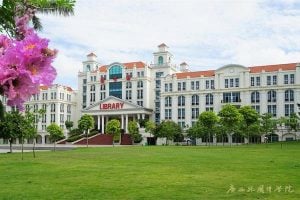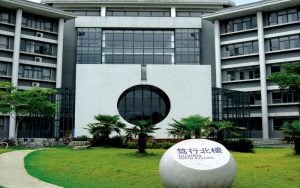Beijing Foreign Studies University
 |
 |
 |
 |
Introduction to Beijing Foreign Studies University
Beijing Foreign Studies University (北京外国语大学, website) is located on Xisanhuan North Road, Haidian District, Beijing. It has two east and west campuses on both sides of the Third Ring Road. It is the first batch of “211 Project” universities and “985” discipline innovation platforms directly under the Ministry of Education. Universities, the first batch of “double first-class” universities.
Beijing Foreign Studies University is the first foreign language college founded by the Communist Party of China. The predecessor was the Russian Brigade of the Third Branch of China Anti-Japanese Military and Political University, which was established in Yanan in 1941, and later developed into a foreign language school in Yanan. After the founding of New China, the school was under the leadership of the Ministry of Foreign Affairs. In 1954, it was renamed Beijing Foreign Studies University. In 1959, it merged with Beijing Russian Language Institute to form a new Beijing Foreign Languages Institute. Directly under the leadership of the Ministry of Education after 1980, it was officially renamed Beijing Foreign Studies University in 1994.
Beijing Foreign Studies University has been approved to open 101 foreign languages. The European and Asian-African populations are currently the largest non-universal language construction bases in China and the first batch of specialty specialty construction sites of the Ministry of Education. The school has formed a pattern of coordinated development of multidisciplinary subjects such as literature, law, economics, and management, with foreign language and literature as the main body. According to the chronological order, the schools are available in Russian, English, French, German, Spanish, Polish, Czech, Romanian, Japanese, Arabic, Cambodian, Lao, Sinhala, Malay, Swedish , Portuguese, Hungarian, Albanian, Bulgarian, Swahili, Burmese, Indonesian, Italian, Croatian, Serbian, Hausa, Vietnamese, Thai, Turkish, Korean, Slovak English, Finnish, Ukrainian, Dutch, Norwegian, Icelandic, Danish, Greek, Filipino, Hindi, Urdu, Hebrew, Persian, Slovenian, Estonian, Latvian Language, Lithuanian, Irish, Maltese, Bengali, Kazakh, Uzbek, Latin, Zulu, Kyrgyz, Pashto, Sanskrit, Pali, Amharic, Nepali , Somali, Tamil, Turkmen, Catalan, Yoruba, Mongolian, Armenian, Malay Gasga, Georgian, Azerbaijani, Afrikaans, Macedonian, Tajik, Tswana, Endebele, Comorian, Creole, Shona, Titi Greinian, Belarusian, Maori, Tongan, Samoan, Kurdish, Bislama, Dari, Tetum, Dhivehi, Fijian, Cook Islands Māori, Rong Hindi, Luxembourgish, Rwandan, Niue, Pigin, Chewa, Sesotho, Zango, Tamakit, Javanese, Punjabi. Adhering to the spirit of Yan’an and adhering to the strategy of serving the country, the school has established official language for countries that have diplomatic relations with China.
Beijing Foreign Studies University currently has 33 teaching and research units. In recent years, the school has established an International Graduate School in cooperation with the University of Nottingham, and successively established the Xu Guozhen Advanced Institute of Languages, Wang Zuoliang Advanced Institute of Foreign Literature, Regional and Global Governance Advanced Institute, The Institute of Advanced Civilization and Humanities Exchange and other distinctive research institutions; vigorously promote the reform of the training mode of talents, and establish Beiwai College, International Organization College, and International Education College. On the basis of the former Asian-African College, it was expanded into the Asian College and the African College. The school has a key humanities and social science research base of the Ministry of Education: China Foreign Languages and Education Research Center, National Language Commission Research Center: National Language Proficiency Development Research Center. 4 regional and national research and training bases of the Ministry of Education (Central and Eastern European Studies Centre, Japanese Research Centre, British Research Centre, Canadian Research Centre) and 37 national and regional research centres registered by the Ministry of Education. Three humanities exchange research centers of the Ministry of Education: China-Indonesia Humanities Exchange Research Center, China-French Humanities Exchange Research Center, and Sino-German Humanities Exchange Research Center. The school edits and publishes four types of CSSCI source publications: Foreign Language Teaching and Research, Foreign Literature, International Forum, and International Sinology, a CSSCI extended source journal “Foreign Language Education Research Frontier”, and “Chinese Russian Teaching” and “Chinese Applications” Linguistics (English), “International Chinese Education”, “English Learning”, “Eurasian Humanities Studies”, “German Humanities Studies”, “French Countries and Regional Studies”, “Regional and Global Development”, “Legal Legal Education” and other publications. The school has the country’s largest foreign language books, audiovisual and electronic products publishing base: Foreign Language Teaching and Research Press.
Beijing Foreign Studies University offers 121 undergraduate majors, of which 44 majors are the only majors in the country. The school currently has 4 national key disciplines (including cultivation disciplines) and 7 Beijing key disciplines. There are 2 doctoral programs in first-level disciplines (foreign language and literature, management science and engineering), and 11 academic master’s programs in first-level disciplines (law, politics, Marxist theory, applied economics, Chinese language and literature, foreign languages and literature, Journalism and communication, management science and engineering, business administration, education, world history), 8 professional masters (finance, international business, Chinese international education, translation, journalism and communication, law, accounting, MBA), covering Literature, economics, management, law, education, history six majors. In the fourth round of national subject evaluation in 2017, the school’s foreign language and literature first-level subject rating was A +, ranking first in the country. The “QS World University Discipline Ranking” was released in 2018, and the two disciplines of school linguistics and modern language once again entered the top 100 in the world, ranking first among similar institutions in China. The university has 5,600 undergraduate students, 3100 graduate students (masters and doctors), and 1,600 international students.
Beijing Foreign Studies University focuses on innovative talent management mechanisms and comprehensively enhances the level of the teaching staff. There are currently more than 1,200 in-service faculty members and nearly 200 foreign teachers from 60 countries and regions. The school has young and middle-aged experts who have made outstanding contributions at the national level, leading talents in philosophy and social sciences of the National Ten Thousand Talents Program, teaching masters of the National Ten Thousand Talents Program, lecturers and professors of the Yangtze River Scholars, national ten million talents project, A group of “talents”, young “Changjiang Scholars” and other high-level teachers. More than 90% of teachers have overseas learning experience. The teacher team of China Foreign Languages and Education Research Center was selected into the first batch of “National College Huang Danian Teacher Team”.
Beijing Foreign Studies University adheres to a high-end, internationally promoted school running idea, conducts exchanges with 313 universities and academic institutions in 91 countries and regions in the world, and communicates with the University of Nottingham, the University of London School of Asian and African Studies, and the French Oriental Language The School of Culture, the Moscow State Linguistic University of Russia, the University of Gttingen, Germany, the University of Rome, Italy, the University of Hungary, Roland, and the University of Jagiellon in Poland have established substantive cooperative relations. The school hosts 23 overseas Confucius Institutes, located in 18 countries in Asia, Europe and the United States, ranking first among domestic universities, including the Confucius Institute at Nuremberg-Erlangen, Germany, the Confucius Institute at Brussels, the Confucius Institute at the University of Vienna, and the University of Rome, Italy. Confucius Institute, Confucius Institute in Krakow, Poland, Confucius Institute in Liege, Belgium, Confucius Institute in Dusseldorf, Germany, Confucius Institute at Roland University in Hungary, Confucius Institute in Sofia, Bulgaria, Confucius Institute at University of Palatsky, Confucius Institute in Munich, Germany, Confucius Institute at University of Malaya, Confucius Institute at Korea Foreign Studies University, Confucius Institute at Barcelona, Spain, Confucius Institute at Moscow State Linguistic University, Confucius Institute at Zayed University, Confucius Institute at London University, Confucius Institute at University of Tirana, Albania, Germany Academic Confucius Institute at the University of Tingen, Confucius Institute at Oxford Brookes University, the Confucius Institute at the University of Colombo, Sri Lanka, the Confucius Institute at the ESCP European Business School, and the Confucius Class at the Marino School in Hawaii
The Beijing Foreign Studies University Library has a collection of nearly 1.45 million books in paper Chinese and foreign languages, more than 2.22 million electronic books in Chinese and foreign languages, 1123 types of Chinese and foreign newspapers and periodicals, and 97 Chinese and foreign databases. Collection features. In recent years, with the development of discipline construction, literature on politics, law, diplomacy, economics, journalism, and management has gradually formed a collection system. The school has continuously strengthened the construction of informatization, formed an “open, interconnected, intelligent, innovative, and integrated” informatization framework, and developed a number of landmark achievements represented by multilingual websites, digital Beiwai, and data center software platforms. Among them, the multilingual website project was launched in 2015 and supports 50 foreign languages. In 2018, it was approved by the Ministry of Education as a pilot university for artificial intelligence to promote the construction of teachers.
Beijing Foreign Studies University has become an important base for cultivating high-quality foreign-related talents in diplomacy, translation, education, economics, trade, journalism, law, and finance. A group of graduates from Beiwai have spread all over the world and across the country, and are active in all walks of life. He has achieved outstanding achievements and has become an elite leader and a pillar of society. According to incomplete statistics, among the alumni who have graduated from Beijing Foreign Studies University, more than 400 have served as ambassadors abroad, and more than 2,000 have served as counselors. The school has thus won the reputation of “the cradle of diplomats of the Republic”.
Campus VR
Teaching Program
![]() ISAC University Teaching Program
ISAC University Teaching Program
Related Universities







